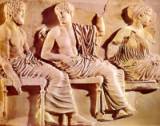9th International Conference on Data Warehousing and Knowledge Discovery (DaWaK 2007), Regensburg, Germany, Sept. 3 to Sept. 7, 2007
Call for Papers
===================
Data Warehousing and Knowledge Discovery has been widely accepted as a key technology for enterprises and organisations to improve their abilities in data analysis, decision support, and the automatic extraction of knowledge from data. With the exponential growing amount of information to be included in the decision making process, the data to be considered becomes more and more complex in both structure and semantics. Consequently, the process of retrieval and knowledge discovery from this huge amount of heterogeneous complex data builds the litmus-test for the research in the area.
During the past years, the International Conference on Data Warehousing and Knowledge Discovery (DaWaK) has become one of the most important international scientific events to bring together researchers, developers and practitioners to discuss latest research issues and experiences in developing and deploying data warehousing and knowledge discovery systems, applications, and solutions. This year's conference (DaWaK 2007), builds on this tradition of facilitating the cross-disciplinary exchange of ideas,experience and potential research directions.
DaWaK 2007 seeks to introduce innovative principles, methods, algorithms and solutions to challenging problems faced in the development of datawarehousing, knowledge discovery and data mining applications. Submissions presenting current research work on both theoretical and practical aspects of data warehousing and knowledge discovery are encouraged. Particularly,we strongly welcome submissions dealing with emerging real world applications such as real-time data warehousing, analysis of spatial and spatiotemporal data, OLAP mining, mobile OLAP, mining natural science data(e.g. bioinformatics, geophysics)
Major Tracks
===============
Topics of interest include in these tracks but are not limited to:
Data Warehousing
===================
* Analytical front-end tools for data warehousing/OLAP
* Active/real-time data warehousing
* Data warehouse architecture
* Web/multimedia data warehouses
* Data extraction, cleansing, transforming and loading
* Spatial and spatiotemporal data warehouses
* Data warehouse maintenance and evolution
* Data warehousing in mobile/wireless environments
* Data warehouse design (conceptual, logical and physical)
* Data warehousing and the semantic web
* Data warehousing consistency and quality
* Data warehouse schema evolution and transformations
* Data warehousing with unstructured data (e.g., text) and semi- structured data (e.g., XML)
* Design and maintenance of metadata repository
* Data warehouse security and reliability
* Data warehousing applications: corporate, scientific, government, healthcare, bioinformatics, etc.
* Parallel /distributed data warehousing
* View maintenance/adaptation
* Frameworks for Business Process Management (BPM) and Business Intelligence (BI)
* Performance optimization and tuning
* Multidimensional modelling and queries
* Data warehousing and industry applications (e.g. ERP, CRM)
* Integration of data warehouses and data mining
Knowledge Discovery
======================
* Knowledge discovery framework and process
* Security, privacy and social impact of data mining
* Integration constraints and knowledge in KDD process
* Mining unstructured and structured data
* Data and knowledge representation
* Exploring data analysis, inference of causes, prediction
* Evaluating, consolidating, and explaining discovered knowledge
* Statistical techniques for generation a robust, consistent datamodel
* Interactive data exploration/visualization and discovery
* Mining temporal, spatial and multimedia data
* Data mining techniques: clustering, classification, association rules, decision trees, neural-network, etc
* Mining large/complex datasets, continuous data streams, sensor networks
* Data mining support for the design of information systems
* Mining ubiquitous, moving, time-series data
* Integration of data warehousing, OLAP and data mining
* Mining Trends, Opportunities and Risks
* Languages and interfaces for data mining
* Distributed and parallel data mining/knowledge discovery
* Mining from low-quality information sources
* High performance and parallel/distributed data mining
* Complexity, efficiency, and scalability in data mining
* Pre-processing and post-processing of data mining
* Data mining applications: bioinformatics, E-commerce, Web, intrusion/fraud detection, finance, healthcare, marketing, telecommunications, etc
Paper Submission Details
==========================
Authors are invited to submit research and application papers representingoriginal, previously unpublished work. Papers should be submitted in PDF orWord format. Submissions must conform to Springer's LNCS format and should not exceed 10 pages (including all text, figures, references andappendices). Authors who want to buy extra pages may submit a paper up to 12pages with the indication that the authors will purchase extra pages once the paper is accepted. Submissions which are not conform to the LNCS formatand/or which do exceed 10 pages (or up to 12 pages with the extrapurchase commitment) will be rejected without reviews.
Submitted papers will be carefully evaluated based on originality,significance, technical soundness, and clarity of exposition. All acceptedpapers will be published in Lecture Notes in Computer Science (LNCS) bySpringer-Verlag.
Duplicate submissions are not allowed. A submission is considered to be a duplicate submission if it is submitted to other conferences/workshops/journals or it has been already accepted to be published in other conferences/workshops/journals. Duplicate submissions thus will be automatically rejected without reviews.
This year, we will plan to have the Best Paper Awards for the best papers selected by the PC-members.
As the last year, authors of best papers selected from DaWaK2007 conference will be invited to submit an extension for a special issue of International Journal of Data Warehousing and Mining (IJDWM).
Authors are requested to send the abstract of their paper to be received byApril 2nd 2007, due date of the full paper electronic submission is April13th 2007.For further inquiries, please contact DaWaK 2007 PC Co-ChairpersonDr. Il-Yeol Song (
song@drexel.edu), Dr. Johann Eder (
johann.eder@univie.ac.at), or Dr. Nguyen Manh Tho (
tho@ifs.tuwien.ac.at)
IMPORTANT DATES
=================
* Submission of abstracts: April 2, 2007
* Submission of full papers: April 13, 2007
* Notification of acceptance: May 25, 2007
* Camera-ready copies due: June 10, 2007
Program Chairs
================
* Il Yeol Song, Drexel University, Philadelphia, USA
* Johann Eder, University of Vienna, Austria
* Tho Manh Nguyen, Vienna University of Technology, Austria
Program Committee details are available on the web site.

